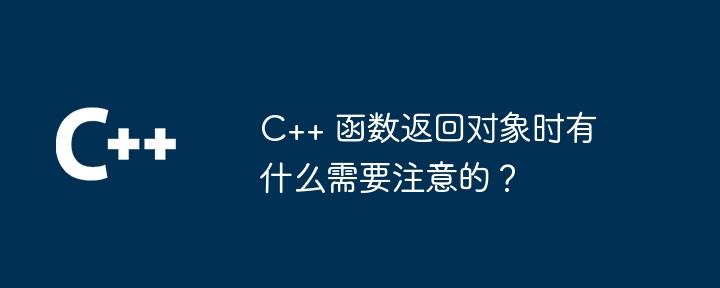
In C, three points need to be noted when a function returns an object: the life cycle of the object is managed by the caller to prevent memory leaks. Avoid dangling pointers and ensure the object remains valid after the function returns by dynamically allocating memory or returning the object itself. The compiler may optimize copy generation of the returned object to improve performance, but if the object is passed by value semantics, no copy generation is required.

Things to note when C functions return objects
In C, functions can return objects, which is different from returning basic data Types (such as int, float, etc.) are similar. However, there are some special considerations when returning objects.
The life cycle of the object
Note: The life cycle of the object is the responsibility of the caller of the function.
After the function returns the object, the memory space of the object is managed by the caller. Therefore, the caller must release the object's memory at the appropriate time to prevent memory leaks.
Avoid dangling pointers
Note: Object access outside the function scope may result in dangling pointers.
If a function returns a pointer or reference to a local object, and the object is destroyed after the function returns, the caller will get a dangling pointer. This may cause program crashes or other undefined behavior.
Solution: Use dynamic memory allocation or return the object itself (value semantics) to avoid dangling pointers.
Return Value Optimization
Note: The compiler may optimize copies of function return values.
By default, when a function returns an object, the compiler generates code to create a copy of the returned object. This may reduce program performance. However, if a function return object is passed by value (value semantics), the compiler may optimize the generation of a copy of the returned object.
Practical case:
#includeclass MyClass { public: MyClass() { std::cout << "MyClass constructor called\n"; } ~MyClass() { std::cout << "MyClass destructor called\n"; } }; MyClass createMyClass() { MyClass myClass; return myClass; // 传递值 } int main() { MyClass myClass = createMyClass(); // 对象生命周期受 main 函数管理 return 0; }
Example output:
MyClass constructor called MyClass destructor called
In this example, createMyClass The function returns a MyClass object (passed by value), the memory of which is managed by the caller (main function). main The function is responsible for destroying the object when it is no longer needed.
The above is the detailed content of What should I pay attention to when a C++ function returns an object?. For more information, please follow other related articles on the PHP Chinese website!
 What are the differences between c++ and c language
What are the differences between c++ and c language
 Recommended learning order for c++ and python
Recommended learning order for c++ and python
 Cost-effectiveness analysis of learning python and c++
Cost-effectiveness analysis of learning python and c++
 Is c language the same as c++?
Is c language the same as c++?
 Which is better to learn first, c language or c++?
Which is better to learn first, c language or c++?
 The difference and connection between c language and c++
The difference and connection between c language and c++
 C++ software Chinese change tutorial
C++ software Chinese change tutorial
 Cost-effectiveness analysis of learning python, java and c++
Cost-effectiveness analysis of learning python, java and c++




